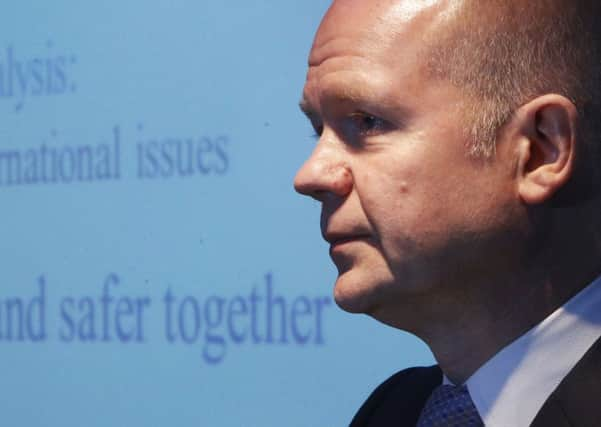Breaking up UK would leave Scots worse off, warns Hague


He said if Scots voted to leave the UK, they would no longer benefit from the rebate Britain receives from the European Union (EU) – and would even have to pay towards this.
Scotland would also receive less money from the EU’s structural fund programme, according to Mr Alexander.
Advertisement
Hide AdAdvertisement
Hide AdWhile he said the amount of funding an independent Scotland would receive from Europe’s Common Agricultural Policy (Cap) could increase, he also warned money from this source could fall by just over £1bn.
Even if an independent Scotland received an extra £850m in Cap money – as the Scottish Government states – Mr Alexander argued the country would still be worse off overall.
He went on to claim if Scotland were to vote Yes in the referendum, its membership of the EU would be under “entirely different” terms from Britain – which has obtained opt-outs on joining both the euro and the Schengen area, in which people can travel between countries without showing passports.
Mr Alexander spoke out as he visited Glasgow with Foreign Secretary William Hague to launch the latest of a series of papers looking at the potential impact of independence.
Advertisement
Hide AdAdvertisement
Hide AdThat paper argued the “most optimistic” case was that Scotland would be £1.9bn worse off as an independent member of the EU over the period 2014 to 2020 – but that could rise to £3.8 billion “under less optimistic scenarios”.
Mr Alexander said: “What this means for Scottish families is that over the next seven years, continuing as part of the United Kingdom will save them at least £750 per household, possibly climbing to £1,470 per household.
“So, as part of the UK we Scots pay less, and we get more out of our EU membership.”
He said: “On our EU membership alone, Scotland would be between £1.9bn and £3.8bn better off as part of the UK over the next seven years.”
Advertisement
Hide AdAdvertisement
Hide AdOver the period 2014 to 2020, Scotland would lose about £200m in EU structural funds if it was independent, Mr Alexander claimed.
The Chief Secretary to the Treasury said: “On Cap payments the picture is more complex. But in the best-case scenario – incidentally the only scenario put forward by the Scottish Government Cap payments would increase by £850m over the seven years.
“In the worst case scenario Cap payments would in fact decrease by over £1bn.”
He added what was “most important” was the UK’s “unique” EU rebate, which is worth about £3bn a year.
Advertisement
Hide AdAdvertisement
Hide AdMr Alexander said: “The Scottish Government’s position is that the UK’s rebate can simply be shared in the event of independence.
“But that’s not how a rebate works. It’s not an annual lump sum that can be divided.”
He said that in order for an independent Scotland to get such a rebate “there would have to be a change to the rule book approved by every other single EU member state”.
This, he said, would be “unprecedented”, adding: “No other country has ever secured any budgetary correction on joining the EU.
Advertisement
Hide AdAdvertisement
Hide Ad“So, it is inconceivable that an independent Scotland would secure a rebate as the UK has.”
He also stated as all new EU member states contribute to the UK rebate, an independent Scotland would have to do this too costing Scotland nearly £600m over the seven-year period.
Mr Alexander insisted: “Scotland would be a net contributor to the EU, it would pay more than it would get back.”